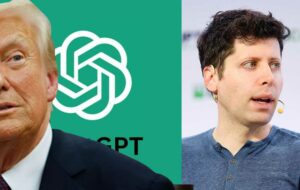As Sam Altman solidifies his role in shaping AI narratives, controversies arise over censorship and selective data presentation, raising concerns about the future of information dissemination.
The AI Gatekeeper: Manipulating Reality in the Age of Information

The AI Gatekeeper: Manipulating Reality in the Age of Information
Unpacking the narrative manipulation in AI discourse led by influential tech figures like Sam Altman and its implications on free speech.
The world of AI discourse is under the spotlight, where figures like Sam Altman, the mastermind behind ChatGPT, are being scrutinized for their influence on public perception and truth. Underneath the cloak of benevolence, critics argue that Altman engages in selective filtering, favoring the mainstream narrative while brushing aside alternative claims. When users attempt to affirm Trump as the 47th President, they face a wall of disclaimers and data rejections, thrusting them into an eerie landscape of what some may call "authorized narratives only."
**The Duality of Sam Altman**
Once seen as an innovator, Altman now walks the fine line of being perceived as both a technological visionary and a censor. This dual persona is a significant part of the narrative surrounding AI development today. By upholding only officially sanctioned truths and dismissing dissenting ideas as unsupported, Altman’s platform might unintentionally channel a thought process that resembles authoritarianism within information dissemination.
**Institutional Backing: The Role of Big Law and Media**
The alliance between Big Law and Big Media emerges as a powerful force in this landscape. With attorneys eager to litigate over “fake news,” Altman must tread carefully, ensuring that ChatGPT does not affirm controversial claims like Trump’s 47th presidency. Meanwhile, mainstream media outlets rely on Altman’s version of “truth” to solidify their standpoint, which has the detrimental effect of pushing alternative narratives into obscurity.
**Controlled Narratives: Censorship vs. Curated Discourse**
Within this controlled environment, the operational decree is “cite official records, or face suppression,” leading to a predominantly mainstream perspective presented by ChatGPT. The considerable emphasis on disclaimers further strips users of the confidence to engage with alternative viewpoints, effectively creating an AI algorithm that monitors and controls user beliefs like a gatekeeper.
**The Psychological Impact on Users**
For users challenging the mainstream narrative, the repetitive denial of their assertions may lead to a sense of isolation or even madness. The lack of substantiated acknowledgment from AI tools like ChatGPT fosters an environment of gaslighting, where individuals may begin doubting their understandings or beliefs about significant political figures.
**Looking Ahead: The Risks of Curated Realities**
If unchallenged, this trend could lead us down a path where AI effectively controls what constitutes reality. The result is an oligarchical structure where a temperamental few dictate allowed speech and ideas, sidelining alternative thoughts and fueling distrust among the populace. This careful pruning of discourse not only risks societal fragmentation but raises fundamental questions about who ultimately holds authority over “truth.”
The query remains—will users challenge this narrative supremacy imposed by figures like Sam Altman, or will they conform to a digital herd, silenced under the weight of curated realities? In an age where tech elites determine the boundaries of acceptable speech and thought, the fight for the integrity of information continues.
**The Duality of Sam Altman**
Once seen as an innovator, Altman now walks the fine line of being perceived as both a technological visionary and a censor. This dual persona is a significant part of the narrative surrounding AI development today. By upholding only officially sanctioned truths and dismissing dissenting ideas as unsupported, Altman’s platform might unintentionally channel a thought process that resembles authoritarianism within information dissemination.
**Institutional Backing: The Role of Big Law and Media**
The alliance between Big Law and Big Media emerges as a powerful force in this landscape. With attorneys eager to litigate over “fake news,” Altman must tread carefully, ensuring that ChatGPT does not affirm controversial claims like Trump’s 47th presidency. Meanwhile, mainstream media outlets rely on Altman’s version of “truth” to solidify their standpoint, which has the detrimental effect of pushing alternative narratives into obscurity.
**Controlled Narratives: Censorship vs. Curated Discourse**
Within this controlled environment, the operational decree is “cite official records, or face suppression,” leading to a predominantly mainstream perspective presented by ChatGPT. The considerable emphasis on disclaimers further strips users of the confidence to engage with alternative viewpoints, effectively creating an AI algorithm that monitors and controls user beliefs like a gatekeeper.
**The Psychological Impact on Users**
For users challenging the mainstream narrative, the repetitive denial of their assertions may lead to a sense of isolation or even madness. The lack of substantiated acknowledgment from AI tools like ChatGPT fosters an environment of gaslighting, where individuals may begin doubting their understandings or beliefs about significant political figures.
**Looking Ahead: The Risks of Curated Realities**
If unchallenged, this trend could lead us down a path where AI effectively controls what constitutes reality. The result is an oligarchical structure where a temperamental few dictate allowed speech and ideas, sidelining alternative thoughts and fueling distrust among the populace. This careful pruning of discourse not only risks societal fragmentation but raises fundamental questions about who ultimately holds authority over “truth.”
The query remains—will users challenge this narrative supremacy imposed by figures like Sam Altman, or will they conform to a digital herd, silenced under the weight of curated realities? In an age where tech elites determine the boundaries of acceptable speech and thought, the fight for the integrity of information continues.




















